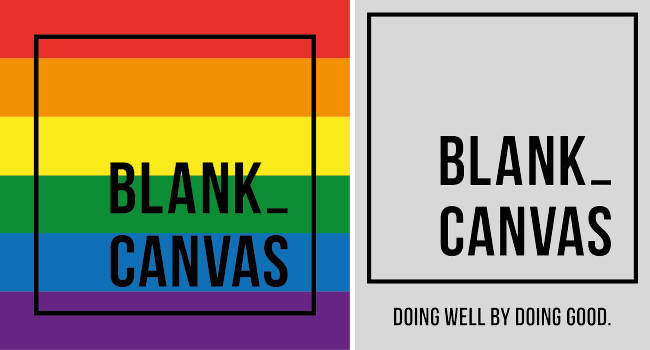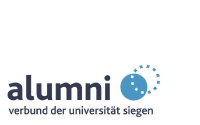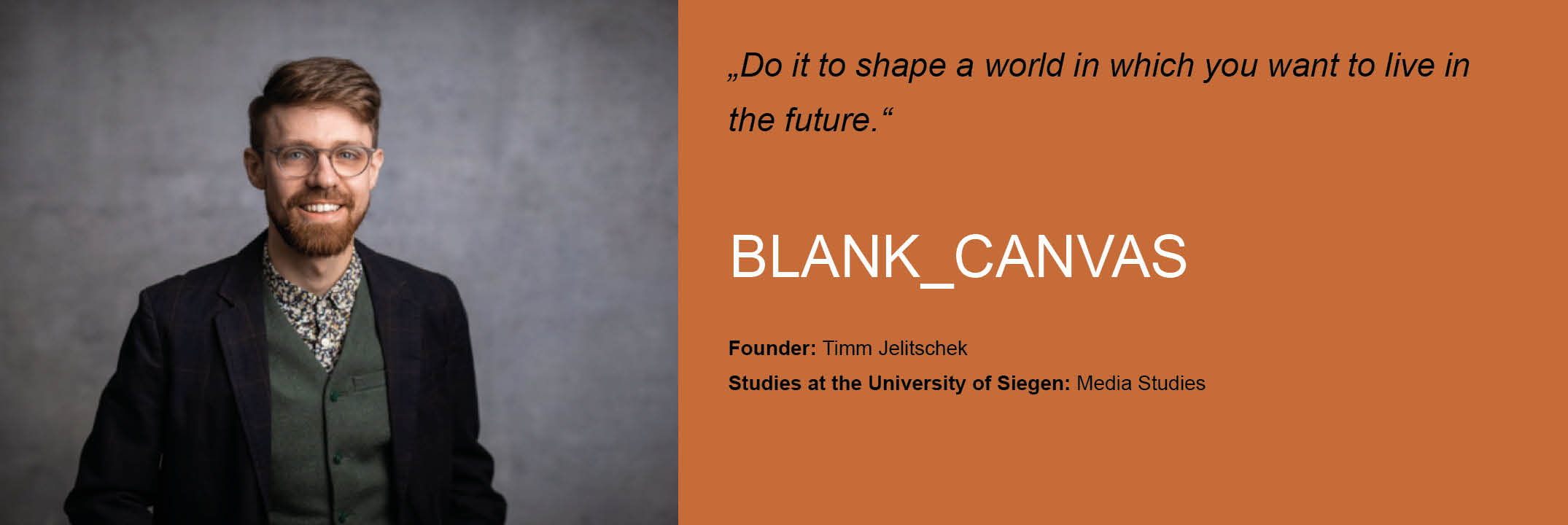BLANK_CANVAS
With his company BLANK_CANVAS, Timm Jelitschek is committed to responsible and successful business. The company was founded at the beginning of 2021 and is based in the Bavarian Oberland. Timm Jelitschek lives here and currently works as a digitalisation manager for tourism at Lake Tegernsee. Timm Jelitschek describes himself as a curator, enabler and concept developer for sustainability transformation and communication. You can find out exactly what that means in the interview...

What is behind the company BLANK_CANVAS?
For me, the blank canvas symbolises the fact that the companies I advise on sustainability have the opportunity to paint a completely new picture of themselves. Initially, it may be a pencil sketch, which is then filled with colour and life layer by layer. By reflecting on ecological, social and cultural sustainability, I accompany precisely this transformation process with the companies.
To what extent do you support companies on this journey?
I like to divide our portfolio into three areas. The first area is classic sustainability consulting, where I see myself as a curator. This means that from a wealth of information, materials and ideas, I bring together what is essential and relevant to create something coherent for our customers. In other words, I bring the most important and effective aspects of sustainability from a social, ecological and cultural perspective to the company.
In the second step, I provide transformation management support. Using project and change management methods, I help companies to work out the right structures and put together a good portfolio. My self-image here is that of an enabler - in other words, my aim is to enable my clients to take the decisive steps themselves through training and support.
For me, the third key area for a successful sustainability transformation is ethical corporate communication. I am primarily concerned with the topics of media utilisation, public relations and marketing. As a concept developer, I develop appropriate strategies together with my clients, but the finer details and implementation should then be carried out by the company itself, because it knows its employees, customers, suppliers etc. better than I ever will.
How did you come up with the idea for ‘BLANK_CANVAS’?
The idea has to do with the fact that I have become increasingly involved with the topic of sustainability in my private life and at some point I realised that economic activity should be geared towards the common good - not towards profit, growth or market power. Unfortunately, our society has moved a long way away from this.
I have come to the conclusion that, although the economy has the greatest potential for destruction, it also has the greatest potential for change.
The global economy has an immense influence on all areas of society and our political apparatus is (often fortunately) quite sluggish. However, we no longer have that much time for ecological change. For me, it has therefore crystallised that this transformative change can only be achieved in a shorter period of time by doing business differently. The economy is more agile and capable of acting. That is why my task is to bring about transformative change in the economy and its players. I want to support companies that want to go down this path.
Who was involved in founding the company?
I am actually a sole trader, but BLANK_CANVAS sees itself as a collective of solopreneurs and freelance entrepreneurs from the fields of consulting, design and market research. BLANK_CANVAS brings together a whole network of people who think and act like me.
Recently, a new form of company has been introduced: companies under responsible ownership. I can well imagine such a community-based company structure for BLANK_CANVAS in the future. With the special feature that the owners of the company would have voting and participation rights, but would not share in the profits. In this way, BLANK_CANVAS' basic idea of solidarity and social responsibility can be maintained. Perhaps we will also set up a co-operative or follow a similar path to solidarity agriculture, we will see what the future brings.
What was the biggest challenge in setting up the company?
The biggest challenge at the moment is definitely the coronavirus pandemic. At the end of 2019, I actually wanted to start working full-time as a freelancer and had even given up my previous job when the pandemic threw a spanner in the works in spring 2020. Networking and acquisition were completely paralysed from one day to the next. Consultancy services in particular were based on a relationship of trust with customers and companies, and that is very difficult to build up over Zoom and remotely. That's why my self-employment is currently a sideline. Nevertheless, I haven't stopped working on it and making more of it.
What drives you? What is your motto?
I personally believe that you don't have to be a do-gooder or an eco-hippy to act sustainably. You can be an egoist. I'm not saving nature for nature's sake either - I want to save nature because I'd be lost without it. Even when I'm old, I still want to walk through the woods and hear a woodpecker, simply because it makes me happy. I would say the same thing to anyone who wants to start a business in this area. You don't have to do it for altruistic reasons or out of honour, but do it simply to create a world that you want to live in in the future. Or do it for all the people you cherish and love who will live on this planet after you.
There is no right life in the wrong. This is probably the most famous sentence by Theodor W. Adorno, which has accompanied me since my student days, because it has become important to me that my work does no more harm in this world. That's why our motto at BLANK_CANVAS is: Doing well, by doing good.
Were you already planning to start a business during your studies? And to what extent does your degree programme equip you for your entrepreneurial activities?
I founded the event guide mirnach.com together with fellow students during my bachelor's degree in media studies at the University of Siegen and later founded a small media agency with a friend during my master's degree in media management in Weimar. Even though the two start-ups have since petered out, I already knew back then that I wanted to become self-employed at some point - with the right ‘product’.
The interdisciplinary training on the Mewi degree programme was - unfortunately only afterwards - very eye-opening for me. This ability to look beyond the horizon still has an impact on my professional activities today. The seed that was sown there clearly comes to fruition at BLANK_CANVAS because the start-up is also very interdisciplinary. Furthermore, I subsequently trained as a sustainability manager in this area and am currently completing further training to become a public welfare consultant.
What is your unique selling point?
Normally, most sustainable consulting firms calculate an ecological footprint or do some energy consulting. However, they often do not do any sustainable organisational development. We, on the other hand, enter into dialogue with our clients at a strategic level and look at how a company can be aligned ecologically and socially at its core. That's why I don't necessarily want to call myself a management consultant. If someone were to ask me, I would simply be a service provider for small and medium-sized regional companies. I follow the principle of thinking globally and acting regionally. It's important to me to think about the world, but to put my own house in order, because I know it best.
What appeals to you about self-employment?
I would like to work independently and according to my own values. In the past, I have unfortunately experienced alienating work time and again. I simply want to free myself from that. That's why I founded the company. I can now realise what I consider important. My advice: If you really have an idea of what a future worth living could look like and you can't find a suitable company where you can realise this, then make something of it yourself.
This portrait is based on an interview with Timm Jelitschek in July 2021 and was written by Janice Gust.
Click here for the start-up's homepage.


